Fleurs du Mal Magazine


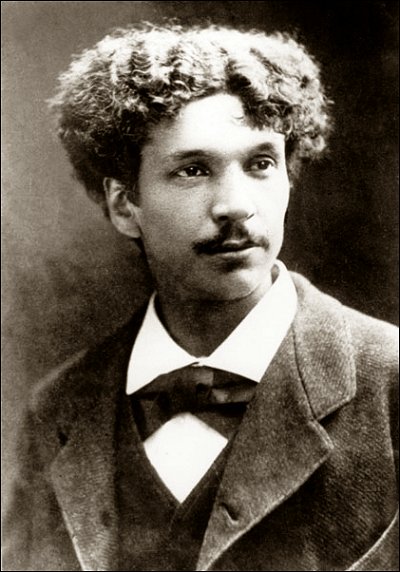
C h a r l e s C r o s
(1842-1888)
A u x i m b é c i l e s
Quant nous irisons
Tous nos horizons
D’émeraudes et de cuivre,
Les gens bien assis
Exempts de soucis
Ne doivent pas nous poursuivre.
On devient très fin,
Mais on meurt de faim,
A jouer de la guitare,
On n’est emporté,
L’hiver ni l’été,
Dans le train d’aucune gare.
Le chemin de fer
Est vraiment trop cher.
Le steamer fendeur de l’onde
Est plus cher encor ;
Il faut beaucoup d’or
Pour aller au bout du monde.
Donc, gens bien assis,
Exempts de soucis,
Méfiez-vous du poète,
Qui peut, ayant faim,
Vous mettre, à la fin,
Quelques balles dans la tête.

Charles Cros poetry
k e m p i s p o e t r y m a g a z i n e
KEMP=MAG
More in: Cros, Charles
.jpg)
Charlotte Brontë
(1816–1855)
Mementos
Arranging long-locked drawers and shelves
Of cabinets, shut up for years,
What a strange task we’ve set ourselves!
How still the lonely room appears!
How strange this mass of ancient treasures,
Mementos of past pains and pleasures;
These volumes, clasped with costly stone,
With print all faded, gilding gone;
These fans of leaves from Indian trees–
These crimson shells, from Indian seas–
These tiny portraits, set in rings–
Once, doubtless, deemed such precious things;
Keepsakes bestowed by Love on Faith,
And worn till the receiver’s death,
Now stored with cameos, china, shells,
In this old closet’s dusty cells.
I scarcely think, for ten long years,
A hand has touched these relics old;
And, coating each, slow-formed, appears
The growth of green and antique mould.
All in this house is mossing over;
All is unused, and dim, and damp;
Nor light, nor warmth, the rooms discover–
Bereft for years of fire and lamp.
The sun, sometimes in summer, enters
The casements, with reviving ray;
But the long rains of many winters
Moulder the very walls away.
And outside all is ivy, clinging
To chimney, lattice, gable grey;
Scarcely one little red rose springing
Through the green moss can force its way.
Unscared, the daw and starling nestle,
Where the tall turret rises high,
And winds alone come near to rustle
The thick leaves where their cradles lie,
I sometimes think, when late at even
I climb the stair reluctantly,
Some shape that should be well in heaven,
Or ill elsewhere, will pass by me.
I fear to see the very faces,
Familiar thirty years ago,
Even in the old accustomed places
Which look so cold and gloomy now,
I’ve come, to close the window, hither,
At twilight, when the sun was down,
And Fear my very soul would wither,
Lest something should be dimly shown,
Too much the buried form resembling,
Of her who once was mistress here;
Lest doubtful shade, or moonbeam trembling,
Might take her aspect, once so dear.
Hers was this chamber; in her time
It seemed to me a pleasant room,
For then no cloud of grief or crime
Had cursed it with a settled gloom;
I had not seen death’s image laid
In shroud and sheet, on yonder bed.
Before she married, she was blest–
Blest in her youth, blest in her worth;
Her mind was calm, its sunny rest
Shone in her eyes more clear than mirth.
And when attired in rich array,
Light, lustrous hair about her brow,
She yonder sat, a kind of day
Lit up what seems so gloomy now.
These grim oak walls even then were grim;
That old carved chair was then antique;
But what around looked dusk and dim
Served as a foil to her fresh cheek;
Her neck and arms, of hue so fair,
Eyes of unclouded, smiling light;
Her soft, and curled, and floating hair,
Gems and attire, as rainbow bright.
Reclined in yonder deep recess,
Ofttimes she would, at evening, lie
Watching the sun; she seemed to bless
With happy glance the glorious sky.
She loved such scenes, and as she gazed,
Her face evinced her spirit’s mood;
Beauty or grandeur ever raised
In her, a deep-felt gratitude.
But of all lovely things, she loved
A cloudless moon, on summer night,
Full oft have I impatience proved
To see how long her still delight
Would find a theme in reverie,
Out on the lawn, or where the trees
Let in the lustre fitfully,
As their boughs parted momently,
To the soft, languid, summer breeze.
Alas! that she should e’er have flung
Those pure, though lonely joys away–
Deceived by false and guileful tongue,
She gave her hand, then suffered wrong;
Oppressed, ill-used, she faded young,
And died of grief by slow decay.
Open that casket-look how bright
Those jewels flash upon the sight;
The brilliants have not lost a ray
Of lustre, since her wedding day.
But see–upon that pearly chain–
How dim lies Time’s discolouring stain!
I’ve seen that by her daughter worn:
For, ere she died, a child was born;–
A child that ne’er its mother knew,
That lone, and almost friendless grew;
For, ever, when its step drew nigh,
Averted was the father’s eye;
And then, a life impure and wild
Made him a stranger to his child:
Absorbed in vice, he little cared
On what she did, or how she fared.
The love withheld she never sought,
She grew uncherished–learnt untaught;
To her the inward life of thought
Full soon was open laid.
I know not if her friendlessness
Did sometimes on her spirit press,
But plaint she never made.
The book-shelves were her darling treasure,
She rarely seemed the time to measure
While she could read alone.
And she too loved the twilight wood
And often, in her mother’s mood,
Away to yonder hill would hie,
Like her, to watch the setting sun,
Or see the stars born, one by one,
Out of the darkening sky.
Nor would she leave that hill till night
Trembled from pole to pole with light;
Even then, upon her homeward way,
Long–long her wandering steps delayed
To quit the sombre forest shade,
Through which her eerie pathway lay.
You ask if she had beauty’s grace?
I know not–but a nobler face
My eyes have seldom seen;
A keen and fine intelligence,
And, better still, the truest sense
Were in her speaking mien.
But bloom or lustre was there none,
Only at moments, fitful shone
An ardour in her eye,
That kindled on her cheek a flush,
Warm as a red sky’s passing blush
And quick with energy.
Her speech, too, was not common speech,
No wish to shine, or aim to teach,
Was in her words displayed:
She still began with quiet sense,
But oft the force of eloquence
Came to her lips in aid;
Language and voice unconscious changed,
And thoughts, in other words arranged,
Her fervid soul transfused
Into the hearts of those who heard,
And transient strength and ardour stirred,
In minds to strength unused,
Yet in gay crowd or festal glare,
Grave and retiring was her air;
‘Twas seldom, save with me alone,
That fire of feeling freely shone;
She loved not awe’s nor wonder’s gaze,
Nor even exaggerated praise,
Nor even notice, if too keen
The curious gazer searched her mien.
Nature’s own green expanse revealed
The world, the pleasures, she could prize;
On free hill-side, in sunny field,
In quiet spots by woods concealed,
Grew wild and fresh her chosen joys,
Yet Nature’s feelings deeply lay
In that endowed and youthful frame;
Shrined in her heart and hid from day,
They burned unseen with silent flame.
In youth’s first search for mental light,
She lived but to reflect and learn,
But soon her mind’s maturer might
For stronger task did pant and yearn;
And stronger task did fate assign,
Task that a giant’s strength might strain;
To suffer long and ne’er repine,
Be calm in frenzy, smile at pain.
Pale with the secret war of feeling,
Sustained with courage, mute, yet high;
The wounds at which she bled, revealing
Only by altered cheek and eye;
She bore in silence–but when passion
Surged in her soul with ceaseless foam,
The storm at last brought desolation,
And drove her exiled from her home.
And silent still, she straight assembled
The wrecks of strength her soul retained;
For though the wasted body trembled,
The unconquered mind, to quail, disdained.
She crossed the sea–now lone she wanders
By Seine’s, or Rhine’s, or Arno’s flow;
Fain would I know if distance renders
Relief or comfort to her woe.
Fain would I know if, henceforth, ever,
These eyes shall read in hers again,
That light of love which faded never,
Though dimmed so long with secret pain.
She will return, but cold and altered,
Like all whose hopes too soon depart;
Like all on whom have beat, unsheltered,
The bitter blasts that blight the heart.
No more shall I behold her lying
Calm on a pillow, smoothed by me;
No more that spirit, worn with sighing,
Will know the rest of infancy.
If still the paths of lore she follow,
‘Twill be with tired and goaded will;
She’ll only toil, the aching hollow,
The joyless blank of life to fill.
And oh! full oft, quite spent and weary,
Her hand will pause, her head decline;
That labour seems so hard and dreary,
On which no ray of hope may shine.
Thus the pale blight of time and sorrow
Will shade with grey her soft, dark hair;
Then comes the day that knows no morrow,
And death succeeds to long despair.
So speaks experience, sage and hoary;
I see it plainly, know it well,
Like one who, having read a story,
Each incident therein can tell.
Touch not that ring; ’twas his, the sire
Of that forsaken child;
And nought his relics can inspire
Save memories, sin-defiled.
I, who sat by his wife’s death-bed,
I, who his daughter loved,
Could almost curse the guilty dead,
For woes the guiltless proved.
And heaven did curse–they found him laid,
When crime for wrath was rife,
Cold–with the suicidal blade
Clutched in his desperate gripe.
‘Twas near that long deserted hut,
Which in the wood decays,
Death’s axe, self-wielded, struck his root,
And lopped his desperate days.
You know the spot, where three black trees,
Lift up their branches fell,
And moaning, ceaseless as the seas,
Still seem, in every passing breeze,
The deed of blood to tell.
They named him mad, and laid his bones
Where holier ashes lie;
Yet doubt not that his spirit groans
In hell’s eternity.
But, lo! night, closing o’er the earth,
Infects our thoughts with gloom;
Come, let us strive to rally mirth
Where glows a clear and tranquil hearth
In some more cheerful room.

Currer Bell (Charlotte Brontë) poetry
fleursdumal.nl magazine
More in: Anne, Emily & Charlotte Brontë, Brontë, Anne, Emily & Charlotte
.jpg)
W i l l i a m S h a k e s p e a r e
(1564-1616)
T H E S O N N E T S
17
Who will believe my verse in time to come
If it were filled with your most high deserts?
Though yet heaven knows it is but as a tomb
Which hides your life, and shows not half your parts:
If I could write the beauty of your eyes,
And in fresh numbers number all your graces,
The age to come would say this poet lies,
Such heavenly touches ne’er touched earthly faces.
So should my papers (yellowed with their age)
Be scorned, like old men of less truth than tongue,
And your true rights be termed a poet’s rage,
And stretched metre of an antique song.
But were some child of yours alive that time,
You should live twice in it, and in my rhyme.
![]()
k e m p i s p o e t r y m a g a z i n e
More in: -Shakespeare Sonnets
.jpg)
O s c a r W i l d e
(1854-1900)
La Bella Donna Della Mia Mente
My limbs are wasted with a flame,
My feet are sore with travelling,
For, calling on my Lady’s name,
My lips have now forgot to sing.
O Linnet in the wild-rose brake
Strain for my Love thy melody,
O Lark sing louder for love’s sake,
My gentle Lady passeth by.
She is too fair for any man
To see or hold his heart’s delight,
Fairer than Queen or courtesan
Or moonlit water in the night.
Her hair is bound with myrtle leaves,
(Green leaves upon her golden hair!)
Green grasses through the yellow sheaves
Of autumn corn are not more fair.
Her little lips, more made to kiss
Than to cry bitterly for pain,
Are tremulous as brook-water is,
Or roses after evening rain.
Her neck is like white melilote
Flushing for pleasure of the sun,
The throbbing of the linnet’s throat
Is not so sweet to look upon.
As a pomegranate, cut in twain,
White-seeded, is her crimson mouth,
Her cheeks are as the fading stain
Where the peach reddens to the south.
O twining hands! O delicate
White body made for love and pain!
O House of love! O desolate
Pale flower beaten by the rain!
.jpg)
O s c a r W i l d e p o e t ry
k e m p i s p o e t r y m a g a z i n e
More in: Wilde, Oscar
.jpg)

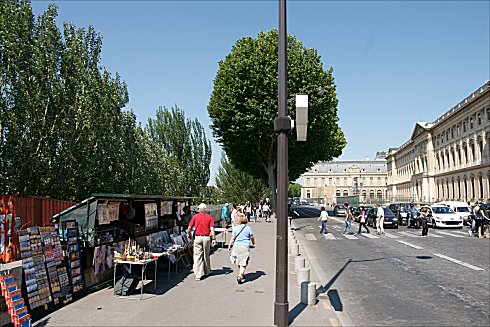
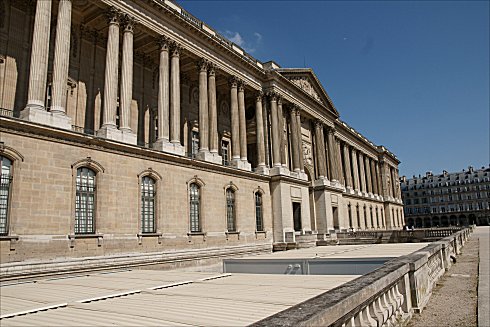
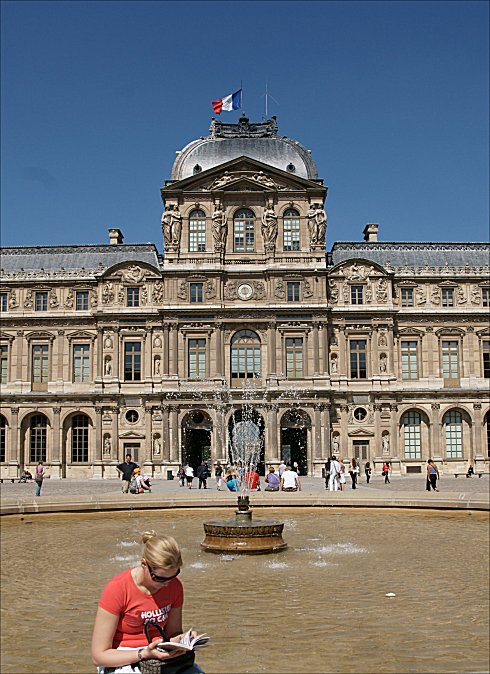


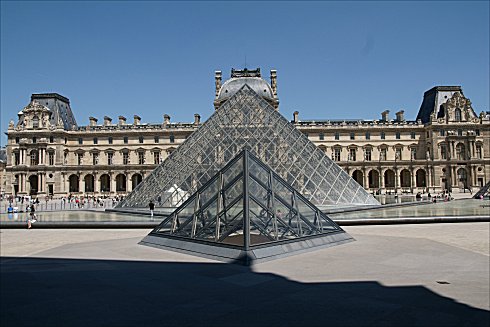
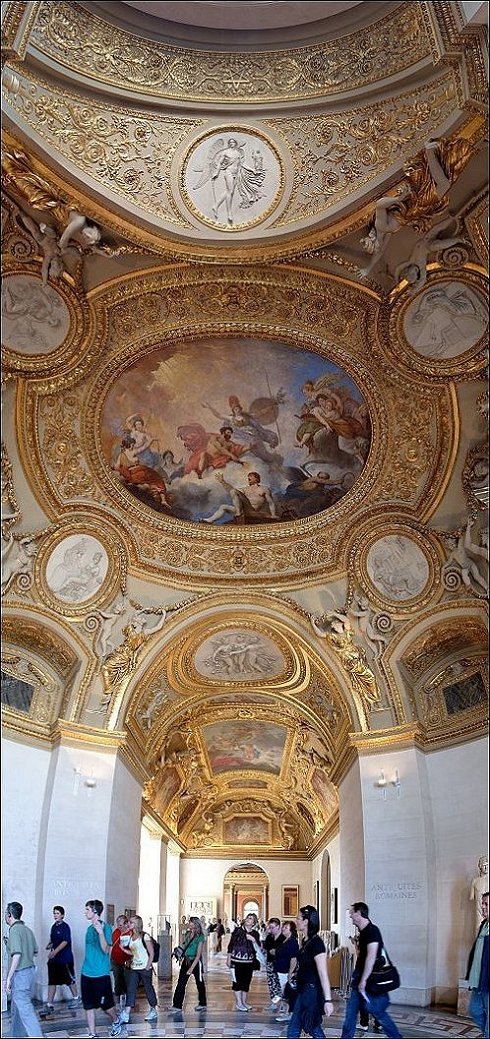
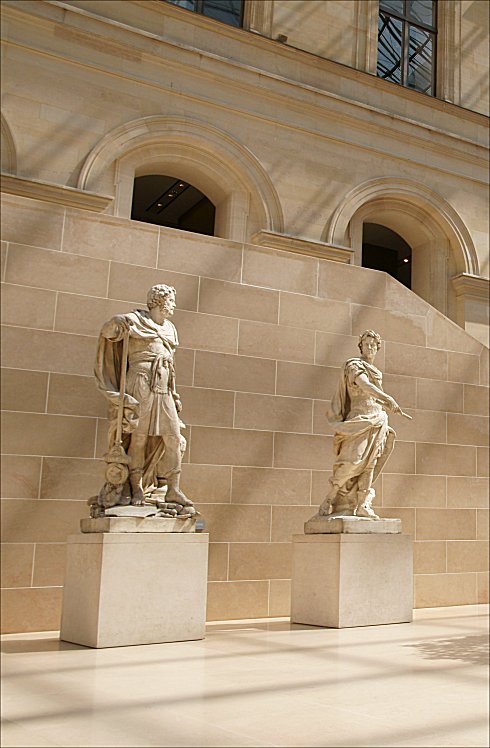
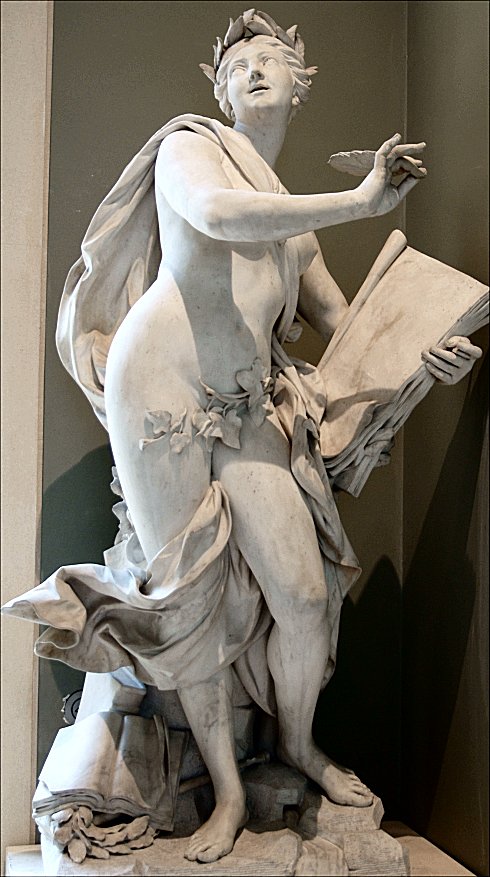


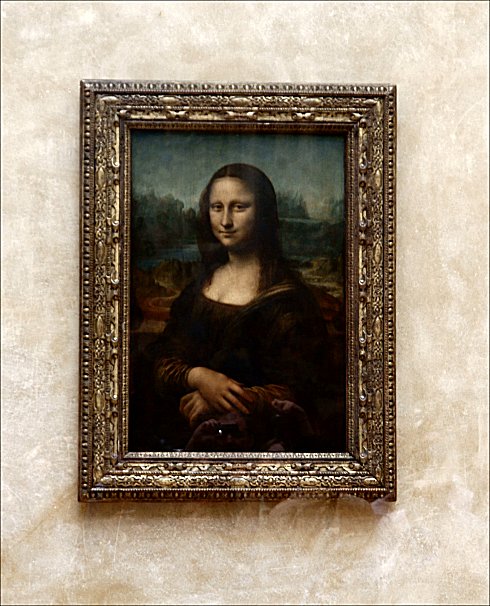

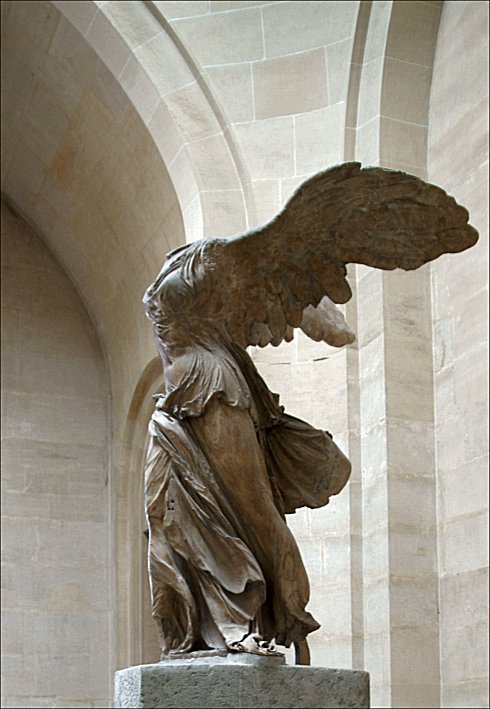
H a n s H e r m a n s p h o t o s
M u s é e d u L o u v r e P a r i s
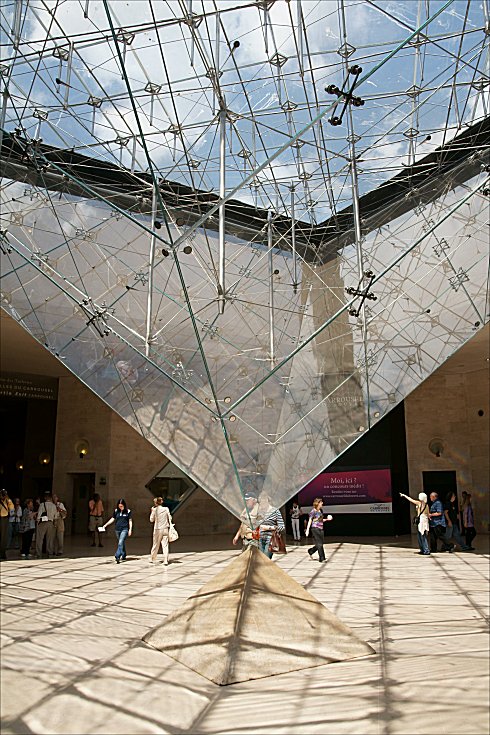
© hans hermans 2009
k e m p i s p o e t r y m a g a z i n e
More in: FDM in Paris, Hans Hermans Photos

J a n G i e l k e n s :
Z e l d z a a m
Hoe zeldzaam is een eerste druk van On the Origin of Species?
NOS-Teletekst meldde op 23 november 2009, dat bij veilinghuis Christie’s in Londen, op de datum dat honderdvijftig jaar geleden On the Origin of Species van Charles Darwin voor het eerst verscheen, een ‘zeldzaam’ exemplaar van de eerste druk van dit baanbrekende boek onder de hamer zou komen. De opbrengst werd geschat op 67.000 euro. Uiteindelijk bracht het ‘stokoude boek’ 114.000 euro op.
Maar is een eerste druk van On the Origin of Species wel zo zeldzaam? Er zijn er 1250 van gedrukt, en dat is een behoorlijk aantal. Als ik even de grote zoekmachines voor antiquarische boeken laat werken, vind ik er binnen tien seconden negen die te koop zijn, in de Verenigde Staten, in Japan en in het Verenigd Koninkrijk.
Het duurste exemplaar kost 225.000 pond, maar dat is dan ook een exemplaar met een opdrachtje van Darwin en met aantekeningen van William Benjamin Carpenter, die als recensent van het boek een belangrijke rol speelde. Twee handelaren in Engeland bieden goede exemplaren aan voor 30.000 pond, en dat is aanmerkelijk goedkoper dan dat van Christie’s. Maar dat heeft iets dat andere exemplaren niet hebben: het stinkt vermoedelijk. Het werd, volgens het Teletekst-berichtje, gevonden op een plank op de wc van een huis in Oxford, waar het veertig jaar heeft gestaan, laat het veilinghuis weten.
Zo’n berichtje verschijnt natuurlijk alleen maar als een belanghebbende een goed persbericht maakt, en in dit geval is dat het veilinghuis. Zou Teletekst ook een bericht maken als iemand een eerste druk van de Nederlandse vertaling uit 1860 door T.C. Winkler zou vinden? Want te koop is zo’n eerste druk niet. En ook niet te vinden in alle Nederlandse bibliotheken die via de Picarta-catalogus te raadplegen zijn.
Ook niet in de Koninklijke Bibliotheek, die onlangs op haar website een dossier aan On the Origin of Species by Means of Natural Selection, or the Preservation of Favoured Races in the Struggle for Life heeft gewijd. De KB, staat daar, bezit de derde editie uit 1869 van de Nederlandse vertaling. ‘U vindt meer dan u zoekt in de KB!’ staat ergens op de website van onze nationale bibliotheek, maar in dit geval toch wat minder dan je zou verwachten. De eerste druk van de Nederlandse vertaling van een van de beroemdste boeken ter wereld: die is dus pas zeldzaam. Wie er een wil inzien moet heel lang zoeken of naar Toronto, want daar hebben ze er een in de universiteitsbibliotheek.
Eerder gepubliceerd op: www.teksteditie.org
.jpg)
k e m p i s p o e t r y m a g a z i n e
More in: - Book Stories, Archive C-D, Jan Gielkens

W i l l e m B i l d e r d i j k
(1756-1831)
Afscheid eens Stervenden
Ja ’t sterfbed is de haven,
Waar ’t scheepjen, uit de zee
Eens levens vol van wee
En zielbedriegend slaven
Komt meeren aan de ree’.
Wat treurt gy, lieve Vrinden,
Wat, teêr geliefde Gâ,
Indien my Gods genâ
Die blijde ree’ doet vinden?
Wat is er vroeg of spâ?
Of wie zal zich beklagen
Die ’s levens heilkust zocht,
En d’ondernomen tocht
In minder tal van dagen
Ten einde brengen mocht?
Neen, danken wy d’Algoede,
Voor ’t overgunstig weêr,
Hetgeen ons over ’t meir
Voor zoo veel andren spoedde:
En geeft Hem lof en eer.
Ja ’k mag u welkom heeten,
ô Hoogstgewenschte kust,
Gy, Paradijs van lust,
Waar, vrij van de aardsche keten,
De Ziel van kommer rust!
Ja, streef mijn hobblend bootjen,
En splintre ’t op den rand
Van ’t steeds gewenschte land;
Ik vrees niet voor dat stootjen,
Want Jezus grijpt mijn hand.
Met barningvolle klippen
Zij heel de kant omzet,
En hulk en vracth verplet;
Die hand zal niets ontglippen
Die wat zy aangrijpt, redt.
Ook u zal zy geleiden
Door ’t dobbrend zeegebruisch
In spijt van ’t stormgedruisch;
Waar ik u ga verbeiden
In ’t vaderlijk huis.
Dus staakt uw teder weenen;
En geeft my d’afscheidsgroet
Met onboeroerd gemoed:
Haast zullen wy hereenen
By ’s Hemels Englenstoet.
1824
.jpg)
Willem Bilderdijk gedichten
k e m p i s p o e t r y m a g a z i n e
More in: Bilderdijk, Willem
.jpg)
Zum Nachdenken für Herrenreiter
Franz Kafka (1883-1924)
Nichts, wenn man es überlegt, kann dazu verlocken, in einem Wettrennen der erste sein zu wollen. Der Ruhm, als der beste Reiter eines Landes anerkannt zu werden, freut beim Losgehn des Orchesters zu stark, als daß sich am Morgen danach die Reue verhindern ließe.
Der Neid der Gegner, listiger, ziemlich einflußreicher Leute, muß uns in dem engen Spalier schmerzen, das wir nun durchreiten nach jener Ebene, die bald vor uns leer war bis auf einige überrundete Reiter, die klein gegen den Rand des Horizonts anritten.
Viele unserer Freunde eilen den Gewinn zu beheben und nur über die Schultern weg schreien sie von den entlegenen Schaltern ihr Hurra zu uns; die besten Freunde aber haben gar nicht auf unser Pferd gesetzt, da sie fürchteten, käme es zum Verluste, müßten sie uns böse sein, nun aber, da unser Pferd das erste war und sie nichts gewonnen haben, drehn sie sich um, wenn wir vorüberkommen und schauen lieber die Tribünen entlang.
Die Konkurrenten rückwärts, fest im Sattel, suchen das Unglück zu überblicken, das sie getroffen hat, und das Unrecht, das ihnen irgendwie zugefügt wird; sie nehmen ein frisches Aussehen an, als müsse ein neues Rennen anfangen und ein ernsthaftes nach diesem Kinderspiel.
Vielen Damen scheint der Sieger lächerlich, weil er sich aufbläht und doch nicht weiß, was anzufangen mit dem ewigen Händeschütteln, Salutieren, Sich-Niederbeugen und In-die-Ferne-Grüßen, während die Besiegten den Mund geschlossen haben und die Hälse ihrer meist wiehernden Pferde leichthin klopfen.
Endlich fängt es gar aus dem trüb gewordenen Himmel zu regnen an.
.jpg)
Franz Kafka: Betrachtung 1913 – Für M.B.
fleursdumal.nl magazine
More in: Franz Kafka, Kafka, Franz, Kafka, Franz
.jpg)
Gerard Manley Hopkins
(1844-1889)
The Handsome Heart
at a Gracious Answer
‘But tell me, child, your choice; what shall I buy
You?’—‘Father, what you buy me I like best.’
With the sweetest air that said, still plied and pressed,
He swung to his first poised purport of reply.
What the heart is! which, like carriers let fly—
Doff darkness, homing nature knows the rest—
To its own fine function, wild and self-instressed,
Falls light as ten years long taught how to and why.
Mannerly-hearted! more than handsome face—
Beauty’s bearing or muse of mounting vein,
All, in this case, bathed in high hallowing grace…
Of heaven what boon to buy you, boy, or gain
Not granted?—Only … O on that path you pace
Run all your race, O brace sterner that strain!
![]()
Gerard Manley Hopkins poetry
kempis poetry magazine
More in: Hopkins, Gerard Manley
.jpg)
Emily Jane Brontë
(1818-1848)
S t a r s
Ah! why, because the dazzling sun
Restored our Earth to joy,
Have you departed, every one,
And left a desert sky?
All through the night, your glorious eyes
Were gazing down in mine,
And, with a full heart’s thankful sighs,
I blessed that watch divine.
I was at peace, and drank your beams
As they were life to me;
And revelled in my changeful dreams,
Like petrel on the sea.
Thought followed thought, star followed star,
Through boundless regions, on;
While one sweet influence, near and far,
Thrilled through, and proved us one!
Why did the morning dawn to break
So great, so pure, a spell;
And scorch with fire the tranquil cheek,
Where your cool radiance fell?
Blood-red, he rose, and, arrow-straight,
His fierce beams struck my brow;
The soul of nature sprang, elate,
But mine sank sad and low!
My lids closed down, yet through their veil
I saw him, blazing, still,
And steep in gold the misty dale,
And flash upon the hill.
I turned me to the pillow, then,
To call back night, and see
Your worlds of solemn light, again,
Throb with my heart, and me!
It would not do–the pillow glowed,
And glowed both roof and floor;
And birds sang loudly in the wood,
And fresh winds shook the door;
The curtains waved, the wakened flies
Were murmuring round my room,
Imprisoned there, till I should rise,
And give them leave to roam.
Oh, stars, and dreams, and gentle night;
Oh, night and stars, return!
And hide me from the hostile light
That does not warm, but burn;
That drains the blood of suffering men;
Drinks tears, instead of dew;
Let me sleep through his blinding reign,
And only wake with you!
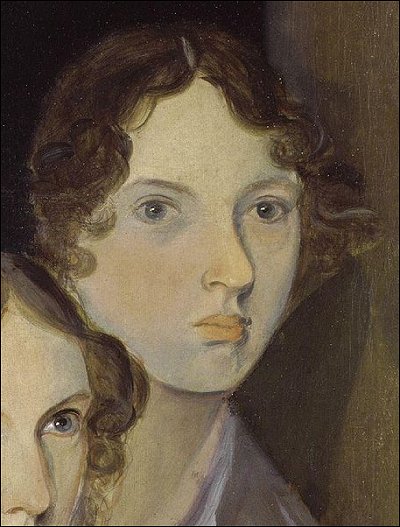
Emily Brontë poetry
fleursdumal.nl magaziine
More in: Anne, Emily & Charlotte Brontë, Brontë, Anne, Emily & Charlotte
.jpg)














Peter Goires photos: E19 (2)
kempis poetry magazine
More in: Peter Goires Photos
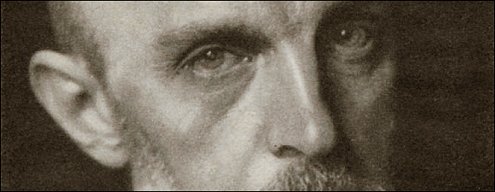
J. H. L e o p o l d
(1865-1925)
P a u l V e r l a i n e †
I
Men mocht wel willen in donzen woorden
van hem te horen, nu hij pas
dood is en wat zijn leven was
voor ‘t eerste stil gaat worden; stoorden
nu woorden niet in zijn beginnen
der vredigheid hem toegebracht
en in de schuwe ernst betracht
door ons, die ons willen bezinnen
over het sidderende, dat wij vonden
in ons; zó het opeens lag neer
in donker, lijden van een zeer
verborgen iets en zeer geschonden.
II
Hoe zoet gesloten, toegesloten
en goed geborgen in donkernis
buiten, waar lente komende is
met regen onder de lucht de blote
een man, die heeft zijn afgewende
leven stil voor zich heen gevoerd,
een povere maar een ontroerd
tedere en hij in zijn ellende
was tot de enige zin gekomen
des levens: dat wij wezen zouden
verscholen, in geduld gehouden
en wegverloren, zó eerst vromen.
Een wijze – en om de dode is veel
van zoetheid en mijmering gebleven
en het bemoeien en dóórleven
der mensen heeft aan hem geen deel.
Januari 1896
J.H. Leopold gedicht: Paul Verlaine (1844 – 1896)

k e m p i s p o e t r y m a g a z i n e
More in: Archive K-L, Leopold, J.H., Verlaine, Paul
Thank you for reading Fleurs du Mal - magazine for art & literature